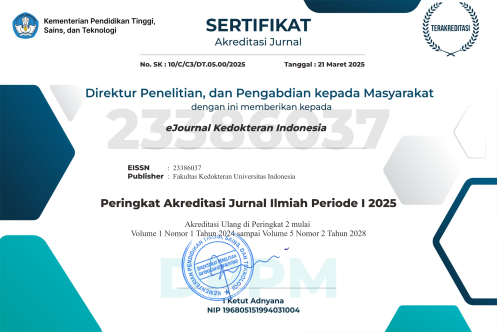A Ten-Year Retrospective Study of the Clinicopathological Profile of Pancreatic Neoplasms at the dr. Cipto Mangunkusumo Hospital
DOI:
https://doi.org/10.23886/ejki.12.648.153Keywords:
Clinicopathological, cystic, pancreatic neoplasm(s), solidAbstract
Pancreatic neoplasms exhibit diverse clinical and pathological features, necessitating collaboration between clinicians, radiologists, and anatomical pathologists to enhance diagnostic accuracy and patient management. This study aimed to provide a clinicopathological overview of pancreatic neoplasms in the Indonesian population from 2012 to 2022. A descriptive-analytical cross-sectional study was conducted using secondary data from the Department of Anatomical Pathology, dr. Cipto Mangunkusumo Hospital and electronic medical records. A total of 62 resected pancreatic epithelial neoplasms were analyzed, with solid neoplasms (85%) and cystic neoplasms (15%) predominant. Clinicopathological profiles were associated with neoplasm types based on stage. Pancreatic ductal adenocarcinoma (PDAC), solid pseudopapillary neoplasms (SPN), pancreatic neuroendocrine tumor (PanNET), and pancreatic neuroendocrine carcinoma (PanNEC) were the most common solid neoplasms. Meanwhile, mucinous cystic neoplasm (MCN) was the most common cystic neoplasm. Both solid and cystic neoplasms were more prevalent among women, with 58% of patients under 50 years old. Patients with PDAC and mixed neuroendocrine-non-neuroendocrine neoplasm (MiNEN) have a higher proportion of <10-month survival rates and advanced stages. Although many clinicopathological features align with existing literature, further research with larger patient cohorts and comprehensive data is warranted.
Downloads
Downloads
Published
How to Cite
Issue
Section
License
Copyright (c) 2024 Jessica Prisscila, Nur Rahadiani, Marini Stephanie, Amelia Fossetta Manatar, Ening Krisnuhoni

This work is licensed under a Creative Commons Attribution-NonCommercial 4.0 International License.
Accepted 2024-09-06
Published 2024-09-11



